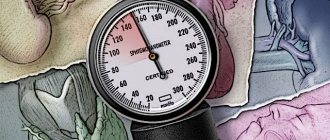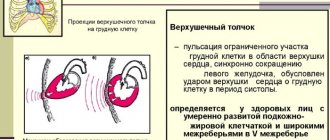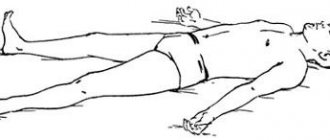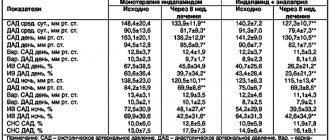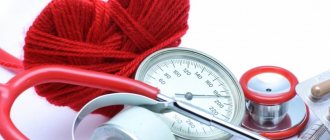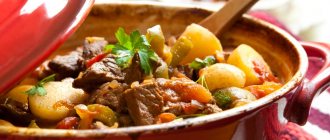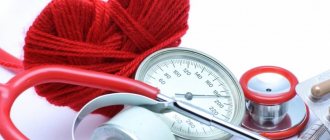Hypertensive crisis
What is a hypertensive crisis and how does it manifest?
A hypertensive crisis is a sharp increase in blood pressure lasting from several hours to several days.
It is manifested by a sharp deterioration in health: the appearance of headache, nausea, vomiting, pain in the heart. A crisis is often accompanied by dizziness, flashing “spots”, numbness of the tongue, lips, face and hands; You may also experience weakness in the legs. The outcome of a hypertensive crisis can be a myocardial infarction or stroke - formidable, dangerous conditions that cannot be allowed to happen!
Factors provoking hypertensive crisis:
- Psycho-emotional and physical stress.
- Stopping or irregularly taking antihypertensive (blood pressure-lowering) drugs.
- Excessive consumption of table salt and liquid.
- Alcohol abuse (drinkers suffer from blood pressure 2 times more often than non-drinkers), tobacco smoking (one cigarette causes blood pressure to rise to 30 mm Hg).
- Excess body weight (an extra kilogram of weight increases blood pressure by 1-3 mmHg).
- Sedentary lifestyle.
- Changes in atmospheric pressure, weather dependence.
Optimal blood pressure should be no more than 120/80 mmHg. Normal blood pressure is 130/80mmHg. Blood pressure is considered borderline - 130-139 / 80-89 mm Hg. Blood pressure is above 140/90mmHg. considered arterial hypertension!
What to do if there is a sudden rise in blood pressure
If your blood pressure has risen, give yourself self-help:
- Take the fast-acting drug captopril (25-50 mg) under the tongue, chew and dissolve until completely dissolved.
- Take a comfortable position, preferably horizontal.
- After 30 min. re-measure your blood pressure. If there is no change, repeat captopril.
- If blood pressure decreased by 20 mm Hg. or more, continue (or resume) the antihypertensive therapy prescribed by your doctor.
- The pressure should be reduced gradually over 1 hour.
- It is necessary to have medications on hand in case of unexpected increases in blood pressure (for example, captopril).
- If the rise in pressure is excessive (over 200/100 mmHg) or is accompanied by the appearance of chest pain, increased headaches, or the appearance of weakness in the limbs, speech impairment, call a doctor at home.
But now the attack has passed, the pressure has been reduced, the patient is not in danger of complications, but the fear and anxiety do not go away... Often a person, especially a lonely person, fears that after the ambulance leaves he will feel ill again and is nervous. Therefore, after a crisis, it is necessary to take any sedative (calming) agent (Corvalol, valerian infusion) and try to fall asleep. Sedatives will help relieve anxiety and avoid insomnia, which in itself can lead to a new increase in blood pressure.
How to avoid a recurrence of a hypertensive crisis
To avoid a recurrence of a hypertensive crisis, you must:
- Measure your blood pressure regularly.
- Take antihypertensive medications regularly.
- Always have a quick-acting drug (captopril) with you.
- Eat small meals. At breakfast before work, it is recommended to eat about 30% of the total daily amount of food, for second breakfast - 20%, lunch - 40%, dinner no more than 10%. Dinner should be no later than 2 hours before bedtime.
- Consume no more than 4-5 g of table salt per day (replace salt with spices, do not add salt to the food on the plate). It is better to avoid eating salty foods such as chips, salted crackers, nuts, soy sauce, smoked meats, and canned foods.
- Eat more vegetables and fruits.
- Do not overeat, especially high-calorie foods (animal fats, fatty meats, sweets, potatoes, flour products).
- Know the optimal weight for your age and gender.
- Avoid excessive consumption of alcoholic beverages.
- Stop smoking.
- Increase daily physical activity.
- Easily mastered mental regulation skills (relaxation and breathing exercises, autogenic training) will help to achieve a reduction in the level of psycho-emotional tension (stress).
- Keep a diary of blood pressure control in the form: Date / Time of day / Blood pressure / Pulse / Notes
Remember! Following these recommendations will teach you to control your illness and live an active, fulfilling life!
Authors: Sharanova O.A. – Deputy Chief Physician of the State Emergency Medical Service V.V. Veselov – doctor of the State Medical Emergency Service
Diet for hypertension
Eating right will help you keep your blood pressure under control.
1. Reduce sodium intake.
To do this, reduce your salt intake or switch to low-sodium salt. The main component of salt is sodium. It retains water in the body. Because of this, circulating blood volume and pressure increase. Doctors believe that salt consumption must be reduced from the traditional 10-15 g per day for modern people to 3-4, which can be obtained from ordinary foods. That is, there is no need to add additional salt to your food.
2. Avoid strong black and green tea, coffee and, most importantly, alcohol.
All these products cause spasm of blood vessels and increase the load on the heart.
3. Stop smoking.
Nicotine has a vasoconstrictor effect, which means it increases blood pressure.
4. Switch to fractional meals.
Distribute your daily diet so that you eat even portions 5-6 times a day. Before going to bed, it is better to eat a small piece of fruit or drink a glass of low-fat kefir.
5. Choose lean meat.
Most often, hypertension occurs due to blockage of blood vessels with plaques of cholesterol, which is found in fatty meats and smoked meats. Chicken, turkey or veal cooked without oil are the best choice for those suffering from hypertension.
If dietary meat seems tasteless without salt and fat, think about lemon juice, parsley, dill or basil, which will safely add a new flavor to the meat.
6. Eat as little food containing animal fats as possible:
sausages, fat, butter and ghee. Take a closer look at vegan sausages and sausages, they will make it easier to switch to a healthy diet and stick to it. Try to have at least a third of the fat in your diet from plant sources. Fry without animal fat, and add sunflower or other vegetable oil to stews.
7. Eat more vegetables
. Foods rich in fiber help reduce the level of bad cholesterol in the blood by preventing its absorption. In addition, they allow you to maintain a feeling of fullness for a long time and not overeat.
8. Eat less sugar.
It is better to exclude easily digestible carbohydrates that cause you to gain extra pounds from your diet. This will reduce the risk of being overweight. So pastries, cookies, cakes and sweets will have to be consigned to oblivion, replacing them with fruits and dried fruits, vegetables and whole grain products - everything that the body will digest for a long time and with pleasure.
9. Increase your dose of magnesium and potassium.
This will strengthen the heart muscle and increase its endurance. Include cereals, cabbage, dried apricots, carrots and beets in your diet. The good news is that these products are not fattening.
No less rich in these important microelements are seaweed, seafood and low-fat sea fish. The rules for preparing fish dishes are the same as for meat - a minimum of salt and fat.
10. Don't go hungry.
Fasting and strict diets with sharp restrictions on any food groups are contraindicated for hypertension.
Main rules of behavior for hypertension
With high blood pressure, split meals are very important; in no case should you follow strict diets and fasts. Smokers simply need to give up this bad habit.
It is necessary to reduce the consumption of salt and fat, avoid foods that provoke an additional increase in blood pressure, and monitor your weight, remembering to periodically consult with your doctor.
You can purchase all the products listed in the healthy eating recommendations in the Food & Health store at:
CJSC Moscow, metro station Novoperedelkino, st. Sholokhova, 30
Telephone
University
→ Home → University → University in the media → Hypertension is “covering.” Removing allies
Judging by the results of many years of foreign and domestic research, over 40% of the adult population suffers from arterial hypertension, and more than 50% of people at retirement age suffer from arterial hypertension.
Judging by the results of many years of foreign and domestic studies, over 40% of the adult population suffers from arterial hypertension (AH), and more than 50% of people at retirement age. Surveys and measurements of blood pressure (BP) among residents of large cities show that every fourth person does not know that he has such a disease. This leads to a doctor being consulted when serious complications develop.
In the early stages, arterial hypertension can be asymptomatic. Patients do not complain, sometimes they note dizziness, pain in the back of the head, nosebleeds, shortness of breath, weakness, tinnitus, but they do not attach any importance to this.
According to WHO experts, systolic blood pressure (upper) is below 140 mmHg. Art. and diastolic blood pressure (lower) less than 90 mm Hg. Art. - the norm regardless of age and gender. However, there is the concept of “target level” - optimal blood pressure values for patients with concomitant pathologies.
Arterial hypertension is divided into primary and secondary. In the majority of patients (up to 95%), it is primary - this is the main ailment. Increased blood pressure with secondary arterial hypertension is a symptom of unhealthy kidneys, renal arteries, endocrine system, etc.
Arterial hypertension. Risk factors:
Uncontrollable - it is impossible to change their influence. These are hereditary predisposition, age and gender.
Controlled - features of lifestyle and behavior. Smoking, excess body weight, alcohol, poor physical activity, salty food are allies of hypertension.
Psycho-emotional stress and prolonged stressful situations increase blood pressure. People whose work involves great responsibility (managers, dispatchers, doctors, nurses, teachers, salespeople, etc.) are at risk.
But positive emotions have a beneficial effect. We all need to be more tolerant and kinder to others, think more about pleasant things rather than bad things, and smile.
Treatment of arterial hypertension
— The disease requires lifelong systematic treatment. The main thing is to achieve the target blood pressure level, protect target organs and prevent cardiovascular complications (cerebral stroke, myocardial infarction, heart failure, sudden death). It has been proven that a decrease in systolic blood pressure by 10–12 mmHg. Art. reduces the risk of myocardial infarction by 16%, cerebral stroke - by 38%, sudden cardiac death - by 21%.
The set of measures consists of medicinal and non-medicinal methods.
The former, in more than 50% of cases, make it possible to prevent progression and damage to internal organs in the early stages of the disease. If pathology already exists, enhance the effect of drug therapy by gradually reducing the dose and number of tablets. Non-drug therapy for arterial hypertension is the use of medicinal plants and a special lifestyle.
If non-drug remedies are not enough, they are supplemented with medications. More than 60 types of medications that effectively lower blood pressure are used in the country. Their mechanism of action is different. Only a doctor, having assessed the risk factors, features of the course of the disease, and the presence of concomitant diseases, can make the right choice.
Sometimes patients refuse to take medications, citing the fact that they tolerate their high blood pressure well and are already accustomed to it. Clinical experience in monitoring such patients shows that they often develop complications - hypertensive crisis, myocardial infarction, stroke. The risk of sudden, premature death is much higher than for those who regularly use antihypertensive drugs.
For treatment to be successful, medications must be taken daily, constantly, and strictly follow the doctor’s instructions. You cannot change the dose without his consent or interrupt therapy. This negates the enormous efforts spent on normalizing blood pressure.
Hypertensive crisis (HC)
According to experts from the European Society of Hypertension, a hypertensive crisis is a state of marked increase in blood pressure, manifested by aggravation of clinical symptoms and requiring a rapid, controlled decrease in blood pressure to prevent or limit damage to target organs.
A hypertensive crisis is provoked by: refusal of treatment, willful withdrawal of medications or dose reduction, emotional stressful situations, overwork, withdrawal syndrome. In weather-sensitive patients, it is often caused by sudden changes in weather.
A jump in blood pressure can occur with any degree of hypertension. As a rule, in the early stages of the disease, the crisis proceeds violently, with a throbbing headache, dizziness, nausea, vomiting, agitation, trembling in the body, and a feeling of lack of air. The patient notes fever, a rush of blood to the head, sweating or coldness of the hands and feet, sometimes “fading” of the heart, pain in it. Such a crisis is manifested mainly by an increase in systolic blood pressure and lasts several hours.
At later stages, more often in elderly patients, a hypertensive crisis develops with increasing symptoms and can last up to several days. Worrying severe headache, ringing in the ears, nausea, vomiting. There is disorientation in time, delirium, depression, lethargy, drowsiness, “grid” or “flickering spots” before the eyes, vision and hearing deteriorate.
Self-help for a sharp increase in blood pressure:
•Sit comfortably, keep your legs down.
• Take one of the medications:
captopril (25 mg). Start with 1/4 tablet (6.25 mg) sublingually or orally. If the pressure has not decreased, repeat after 30–60 minutes;
clonidine (clonidine) - 0.075 mg. Inside or under the tongue. Can be repeated after 30–60 minutes to achieve the desired effect;
nifedipine (10 mg) sublingually or orally. If you experience intense pain in the heart and rapid heartbeat when your blood pressure rises, do not use it;
• for chest pain, take 1 tablet of nitroglycerin under the tongue or inject it under the tongue (do not inhale!) 1 dose in an aerosol. Sometimes this results in a severe headache. Therefore, it is recommended to use nitroglycerin together with validol. If the chest pain does not go away, taking these medications must be repeated (with an interval of 3 minutes) - up to 3 times;
when the pain behind the sternum continues to torment after that, call an ambulance. Before her arrival, chew half a tablet (0.25 g) of acetylsalicylic acid (aspirin).
• For severe emotional stress or palpitations - 40 drops of Valocordin or Corvalol.
A sharp decrease in blood pressure with rapid achievement of normal values is dangerous (fraught with ischemia of vital organs). Blood pressure should be reduced by 15–25% in the first 2 hours after taking the drugs, and then it gradually drops over another 2–6 hours. Remember that the effect of the drug begins in 10-30 minutes, so do not swallow everything in a fright. During a crisis, monitor your blood pressure every 15 to 30 minutes.
If an increase in blood pressure is accompanied by severe pain in the heart, suffocation, shortness of breath, neurological symptoms (double vision, impaired speech, vision), deterioration in general condition, call an ambulance immediately. While she is driving, use the self-help measures described above.
Elena Belskaya , Associate Professor of the 2nd Department of Internal Diseases of the Belarusian State Medical University, Candidate of Medical Sciences. Sciences Medical Bulletin , January 6, 2011
Share
State Autonomous Institution "Shilkinskaya Central District Hospital"
What changes need to be made to your diet?
- Limit your salt intake.
- Limit fluid intake to 1.5 liters per day.
- Increase the consumption of foods high in: potassium (baked potatoes, apricots, prunes, beans, raisins, seaweed), magnesium (bran, beans, oatmeal, prunes, seaweed, millet).
- You should eat a variety of vegetables and fruits - at least 400 g per day in addition to potatoes. Preference should be given to locally produced products.
- It is recommended to replace meat and meat products with a high fat content with lean meats, fish, poultry, eggs, and legumes.
- Stop drinking alcohol.
What is recommended if you have high cholesterol?
- Consume no more than 2-3 egg yolks per week, including eggs used in cooking.
- Limit consumption of offal (liver, kidneys, brains), fish roe, shrimp, crabs (no more than once a month).
- Eat lean varieties of meat, fish, and poultry, cut off visible fat, remove fat rendered during cooking, remove the skin from game.
- Replace deep frying, especially using animal fats, with stewing, boiling, and baking.
- Exclude all types of smoked meats, fatty sausages, fatty ham, lard, brisket, and loin.
- Dress salads not with sour cream and mayonnaise, but with vegetable oils.
- Avoid eating butter.
- Use low-fat varieties of kefir (1%), skim milk, low-fat (4%, 9%, 11%) varieties of cottage cheese and cheese (Suluguni, feta cheese, Ossetian, etc.).
- Consume fruits and vegetables - at least 400 g per day.
- Use wholemeal bread.
- Give preference to “white” meat (poultry, fish), limit “red meat” (beef, lamb, pork) to 3 times a week.
How to limit your salt intake?
- Limit your total salt intake to 5 g (flat teaspoon) per day. You should use iodized salt.
- Get rid of the habit of adding salt to food at the table without tasting it.
- Avoid pickles, marinades, canned and smoked products.
A healthy diet helps normalize blood pressure!
The result of your treatment largely depends on your diet.
Self-help for hypertensive crisis
A hypertensive crisis is a sudden, sharp rise in blood pressure, accompanied by a deterioration in health and the development of complications.
Types of crises:
- Type I crises occur with a relatively low increase in blood pressure. They are manifested by a sharp headache, redness of the skin, primarily the face, palpitations, trembling, chills, and excessive urination.
- Type II crises occur against the background of very high blood pressure numbers with various manifestations in the brain and heart. Severe headaches, nausea, vomiting, visual disturbances, convulsions, and drowsiness are noted. With the development of symptoms of heart damage, severe shortness of breath and angina attacks appear. With crises of this type, the development of cerebral stroke and myocardial infarction is possible.
Factors contributing to the development of hypertensive crisis:
- emotional or physical overload;
- weather changes, meteorological changes (“magnetic storms”);
- smoking;
- abrupt withdrawal of medications that lower blood pressure;
- consumption of alcoholic beverages;
- large meals, especially at night;
- eating food containing large amounts of salt;
- consumption of food or drinks containing substances that increase blood pressure (coffee, chocolate, cheese, caviar, etc.).
Self-help for hypertensive crisis:
- Measure blood pressure.
- If possible, quickly try to reduce high blood pressure on your own: fast-acting drugs can be used: clofellinum 0.075–0.15 g or
- captopril 25–50 mg.< or
- nifedipine 10 mg;
do not use ineffective drugs - papazole, dibazole tablets;
- you should not sharply reduce blood pressure over a short period of time, especially in old age; symptoms such as weakness, drowsiness may indicate malnutrition (ischemia) of the brain.
- Re-measure blood pressure.
If chest pain occurs (a manifestation of angina), you should take nitroglycerin under the tongue.
If there is a significant increase in blood pressure or if the symptoms of a crisis increase, it is recommended to call an ambulance.
Further actions will be determined by the ambulance doctor.
Try to eliminate the causes that cause the development of a hypertensive crisis and strictly follow the recommendations of your attending physician.
Then you can avoid complications.
Remember: a lot depends on you!
